Why Does It Have To Be A One-upmanship Though? I've Never Heard People Say Doctors Are Better Than Vets,
why does it have to be a one-upmanship though? I've never heard people say doctors are better than vets, and even if some do, surely smugly saying 'we know so much more' makes you just as bad? Can't we accept that they are both very demanding, difficult jobs in their own ways? There are so many differences I think it's hard to even compare them.
Mk, I told you I wasn’t going to discuss this anymore unless you came off anon, but I think this is important because I know I have a few medblr followers and a lot of not-medical-at-all followers.
This is not one-upsmanship. “Real doctors treat more than one species” is a joke - in response to being treated like we’re not as good as MD’s. You can literally buy T-shirts and bumper stickers with that on them. As I stated when I responded to your original ask, all of us in the veterinary profession have respect for doctors. Another common saying in the field is “I’m in vet med because humans are gross.” But somebody has to treat them, and we’re glad it’s not us. Many of us would prefer that animals come in sans owners. During the rest of this post, keep in mind that I (and the vast majority of vets) respect MD’s because we need them just as much as they need us. But that doesn’t make us any less than them.
You say it’s hard to compare them - you must be on the human medical side. Want to know some similarities?- We go to school for the same amount of time.- The prerequisite courses for getting into school are nearly identical.- We accumulate approximately the same amount of debt from our schooling.- We learn much of the same material. Anatomy, histology, general/systemic pathology, clinical pathology, physiology, neurology, pharmacology, immunology, toxicology, bacteriology, virology, radiology, theriogenology (aka veterinary gynecology), ethics, business, medicine/treatment, surgery, public health, nutrition, epidemiology… except we learn it for every species, not just one. More on that later.- Vets have to learn about humans too, because we have to know how animals can infect humans. For example, we have to know how every single veterinary parasite in our 3-credit, semester-long parasitology class can potentially affect/not affect humans. Med students spend one or two lectures on parasites.
But you’re right, there’s a lot of differences.- Vet schools are 3-4x harder to get into than medical schools.- Vet school is harder, full stop. Not only are we learning the same things as med students, we have to learn it for every animal species plus some human stuff, and we have to be prepared to actually practice after four years of education without an internship or residency to catch us after school is over. Yes, some students will choose to go the internship/residency route, but the majority will not. Another common joke in vet school, which my professors have literally said to my entire class more than once, is “if you wanted it to be easy you should have gone to medical school.”- An MD is unlikely to be injured by their patients on an average day. A vet is.- When I graduate, I will have performed upwards of 50 surgeries on at least 4 species of animals, despite the fact that I have no intention of specializing in surgery. A human medical doctor has to wait until their residency to do even one surgery, and that’s only if they’re specializing in a field that requires surgery on a routine basis.- Upon graduation, for any given patient I may have to be a general practitioner, gastroenterologist, dermatologist, cardiologist, pediatrician, emergency doctor, radiologist, orthopedist, oncologist, behaviorist, endocrinologist, surgeon, dentist, neurologist, internist, pathologist, pharmacologist, pulmonologist, anesthesiologist, OB/GYN, physical therapist, opthalmologist, and more during their lifetime. Medical doctors have to specialize in a single one of these things. Lucky me, I don’t have to choose. Poor me, I have to know every single one of these specialties for every single animal. Hence, knowing more and doing more than MD’s.- Show me a human general practice clinic (or even hospital) where I can come in with a bellyache, vaginal discharge, and diarrhea and have an exam, bloodwork, x-rays, ultrasound, and emergency hysterectomy all in the same department, within 2-3 hours of arrival, and go home the same day if absolutely necessary or at least the next day. Yeah, not gonna happen.- Vets have to pay for equipment/supplies, building expenses/upkeep, and staff salaries in addition to their own salaries, and this is incorporated in the cost of vet care. Human clinics are subsidized so they don’t have to worry about this…- … and still charge upwards of 5-10x as much for the same procedure that a vet does. Here’s a total hip replacement comparison, for example.- Because of the two above points, if a client stiffs a doctor, it’s not a big deal - the government and the practice insurance will cover it. The lights will not go off. If a client stiffs a vet… well that one client might not make the lights go off, but now the vet isn’t going to be able to offer clinic-based payment plans because they simply can’t afford to be stiffed anymore. Some practices won’t even send a bill and instead require payment up front, because collections cost more than the bill is worth (that’s how low veterinary bills tend to be, comparatively), and these clinics will still get slammed on Facebook/Yelp/Google for “only caring about money and forcing me to pay upfront when my puppy was dying.”- Humans are required to have insurance, but pets are not. This leads to a lot of emotionally demanding decisions for both the vet and owner (I can’t afford his care - do I put him down? surrender him to the clinic if they’re able to take him? bring him home and let him die? toss him to a shelter and let him suffer?) and a lot of emotionally demanding owners ( “If you really loved animals you would treat him for free” - well yes Becky, but I have to eat and pay my student loans/mortgage too…)- Despite our similar educational debt load, my average salary will be less than half of an MD’s. And people still think we charge too much and make too much and try to guilt us into performing services or giving items at a discount or for free.- Vets can put patients down. While this is usually a blessing, it does mean that patients we’ve treated since they were babies are now dying because we can’t do anything to save them, whether due to owner finances or inability to cure a terminal illness. That’s hard enough as it is, but then you get clients who are moving, had a baby, don’t want the pet for whatever reason, and demand you put the animal down instead of doing something else to try to rehome it - “convenience euthanasias.” Both types take an emotional toll on vets, and euthanasias happen every day, usually multiple times.- A vet’s work-life balance is notoriously terrible. Non-ER MD’s can turn away people who walk in at 4:55 when the practice closes at 5. Vets often can’t (or don’t). Because our patient care is so much more involved, it’s rare for vets or vet staff to be able to leave on time even from general practice, and that says nothing for emergency care or the many vets who are on call nights, weekends, holidays… At the first practice I worked at, staff members got to choose one (1) holiday PER YEAR to get off, and were expected to work every weekend.- Due to the previous 5 points, suicide and mental illness in the veterinary field is at an all-time high. Vets are twice as likely to commit suicide than an MD. It’s alarming, and the field is working to change it, but not much can be done on a national scale.
In fact, maybe you’re right. Maybe there really is no comparison. If you read all that, I think you’ll understand that vets have earned a little bit of wiggle room to poke some harmless fun at their “real doctor” colleagues.
Oh, and not to mention the biggest difference between MD’s and DVM’s, but…

More Posts from Swirlspill-study and Others
Anti-Indigenous things to quit saying/doing:
- Stop saying “off the reservation”. It’s a reference to the pass system that was in place restricting Native people from leaving without permission.
- Stop making “1/16th”, “great-great grandmother”, etc. jokes. All of these reference blood quantum, a system designed to “breed out the Natives”. Indigeneity isn’t defined by a percentage, fraction, etc. Quit policing Indigenous identities and quit joking about genocidal tactics.
- Stop calling things your “spirit animal”. You don’t have one. Only Indigenous people from specific nations have spirit animals.
- Stop making dreamcatchers. They are sacred Anishinaabe culture and are not cute trinkets, crafts, etc. Buy them from Anishinaabe artists.
- Stop buying those little cloth “teepees” for your kids/pets/whatever. Also stuff with tipi prints
- Quit referring to your “tribe”. Enough with the “bride tribe” nonsense and all the rest. Stop trivializing tribal affiliations.
- Don’t wear “war paint”. Don’t put a feather in your hair. Don’t dress up as Native people or characters.
- Stop referring to your meetings/side discussions/parties as a “pow wow”.
- Stop supporting sports teams that use racist terms and logos and caricatures of Indigenous people.
- Stop using white sage. It is sacred and overharvested. There are lots of types of sage you can use instead.
- Stop “smudging”. Smoke cleansing exists in many forms in many cultures, use that. Non-Natives can’t smudge.
- Stop tokenizing your Native friends, classmates, in-laws, half siblings, etc.
Please add more!
5 Things to Probably Never Do on the SAT Essay
Qualifier: Rules are made to be broken, and those below are no exception. Having said that, here are some habits I’d recommend steering clear from on your SAT essay.

1. Probably never use the generic “you.”
Example: “You never know what kind of problems you might get into if you aren’t careful.”
Why this sentence isn’t great: It’s informal, and pretty general.
What to do instead: use “one” in place of “you.” As in, “One never knows what kind of problems one might get into if not careful.” Or, better yet, rewrite the sentence so you to avoid referring to an ambiguous, hypothetical person.
2. Probably never begin an essay with the words “Throughout history…”
Example: “Throughout history, many people have had many different beliefs.”
Why this sentence isn’t great: Again, it’s too general. There isn’t time enough to discuss all recorded history in 25 minutes. So don’t try.
What to do instead: Limit the scope of your argument. Start small, specific. (I’m not going to rewrite the sentence above, as it’d be better to delete it and re-think how to set up the thesis.)
3. Probably avoid generalizations and extreme language.
Example: “Horrible things happen to high school students all the time and they remember those things forever.”
Why this sentence isn’t great: Generalizations like this tend to be either impossible to prove or just plain wrong.
What you can do instead: Qualify your statement, which means to “limit,” “modify” or, as I like to say, “dial it back.”
Rewritten Example: “Certain negative high school experiences are likely to leave a lasting impression.” (Notice how “all” becomes “certain,” I’ve added “likely” and “forever” becomes “lasting impression.”)
A few more words on “qualifying” (because it’s really super important):
We tend to think of “qualifying” as “being eligible” for something. It sometimes mean that, but not here. In this case, I mean taking extreme words and limiting or restricting them. Examples:
Extreme word → Qualified version
“all” → “some” or “certain”
“everyone” → “many people” or better yet, “some people”
“always” → “often,” “in some cases,” “sometimes”
“never” → “rarely” or “seldom”
A few more examples: “My brother is always throwing things at people.” (or) “All men are evil.”
Why these sentences aren’t great: Because these statements aren’t true. And they’re impossible to prove. Read them again and imagine them literally.
Then imagine the evidence you’d need to prove them.
What you can do instead: Qualify ‘em! Dial ‘em back! “My little brother sometimes likes to throw things at people.” (or) “Some argue that all humans have the capacity to do evil.”
*Fun fact: Notice anything about the title of this blog post? #takingmyownadvice
4. Probably never use a hypothetical example.
Example: “When someone says something bad about you it’s like they’re judging you without knowing you.”
What’s not great about this sentence: A few things:
The generic “you.”
It’s general.
It’s a hypothetical example. In other words, it’s not citing something specific that actually happened, so it doesn’t really count as evidence.
What you can do instead: Write about something specific that actually happened. “Last week, when my friend Jac told me that the way I was dressed was “way too preppy,” I felt as if I were being judged.” See how specific?
5. Probably never cite facts without proving them.
Example: “The world is getting more peaceful every day.”
What’s not great about this sentence: Is that true? Can you prove it? How?
What you can do instead: Again, get more specific.
Rewritten example: “Using statistical analysis, psychologist Steven Pinker has argued that the gradual decrease of military conflict, genocide, homicide, torture, and other acts of violence over the last few centuries has led to the present era being the most peaceful time in human history.”
Here’s one more:
Unfounded claim: “You have to see and hear something to learn about it.”
Rewritten: “Last year in my AP Psych class we read an article that discussed a study in which some participants received information both visually and aurally while others received the same information only visually or aurally. It turned out that those who received both kinds of information were 20% more likely to retain that information a year later.”
Written by Ethan Sawyer








did some review for our botany quiz on monday! i accidentally fell asleep throughout the entirety of our teacher’s three-hour lecture, but thank the heavens for powerpoint presentations aaaa
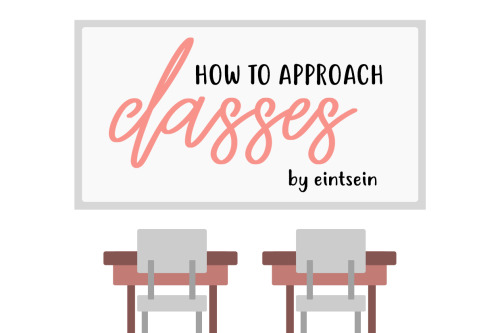
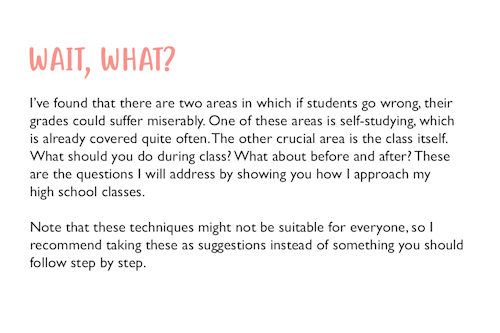
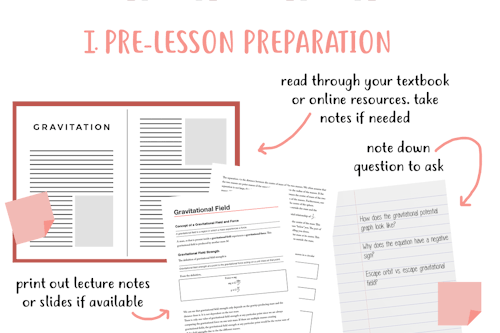
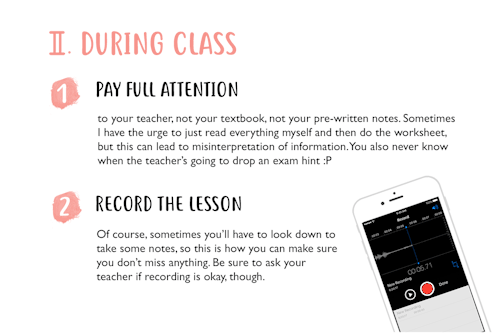
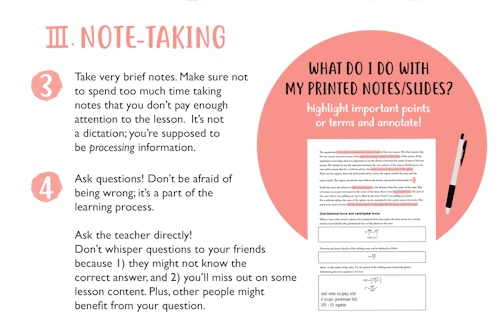
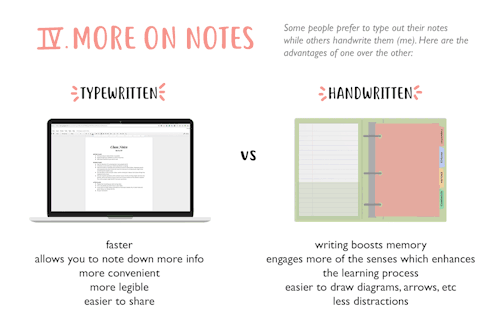
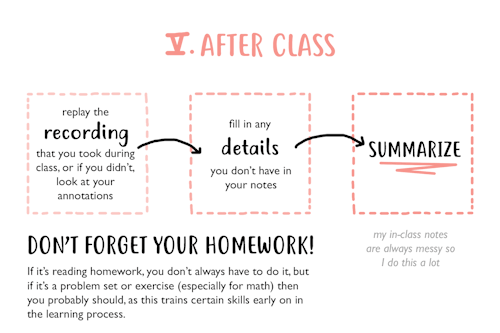

HOW TO APPROACH CLASSES A guide to getting the most out of your classes and lectures
By Eintsein
Design inspired by this post by @journalsanctuary
100 Reasons to Study:
I never expected this “reasons to study” thing to get so many submissions, and as it takes me so long to post them all, I decided to do a bulk post of some so here they are:
(If I haven’t included a url, it was submitted by an anon).
To prove people that “bad” students can become excellent students too.
To expand your knowledge of the world.
To look back on your success in ten years time. (Submitted byadxlastudies)
To not let my mental illness define my grades. (Submitted bymusicandmaths)
I study because I am privileged enough to have the opportunity. I study because I have no one getting in my way telling me I can’t. I study because I want to do some real good in this world. I study because I live in a country where being female has no significant disadvantage; and so, I take this opportunity so that I may make future opportunities for those who don’t have them. (Submitted by crimson-voltaire)
My reason for studying is how I’ll get to where I want to be in my life which is successful, comfortable, and happy.
I study to make my mum happy and proud.
I study to prove my anxiety wrong!
I study because I want to save lives.
I study because my grandpa, orphaned during WWII when he was 8, worked 4 days a week in a mine to learn for 2 days. He’s retired after 40 years of working in diplomacy, for the last 5 years as an ambassador. He’s my role model. And I love him so much.
I study because my primary school teacher from when I was 6 replied “Well who would think that?” when my mother informed her I was going to university. I study so I can tell her “Why would you not think that?”
I study because I want to give myself the best future I possibly can as a black woman. (Submitted by n-marlzz)
I study because my dreams are improbable. But not impossible. I will achieve them. (Submitted by redheadbecool)
I study because even though I can’t imagine having a future, I want one. (Submitted by stxdys)
I study so that I can be surrounded by the right people at school, at home, at work, and on Tumblr. You can only walk the path that you choose for yourself, so choose wisely. Pave your path with bricks, not straw.
I study because last year I was in a mental hospital for young people and I discovered that I want my death to mean something.
I study because diseases have haunted my family for long enough, and cancer deserves to be taken down once for all.
I study because my father left school at age 13 to work to provide for his family and he has been working ridiculously hard ever since so I can have an education.
I study to be self reliant and to get more answers. The concept of being independent is attractive to me, and if i study hard enough, i will be able to live freely without relying on my parents. The thought of getting answers is a huge satisfaction.
I study because I told my ex, “Watch me go to Harvard”. So oops.
Because I want to have a well paying job which means I can eventually travel the world one day.
I study because I love to be productive really just in love with the feeling of it being noon and already have gotten everything done that I needed for that day. (Submitted by revision-babe)
I want and I like to study because I believe that we as humans have the responsibility of maintain and grow the knowledge people developed in the past. How could we waist all those efforts to try know this wonderful world a little better? (Submitted by mochilunar-universe)
I study because my Dad went through a lot of work to get to this country so that I could have a good life and a good education, and I’m not going to waste all his good efforts and take him and my education for granted.
Because I believe I can do it and I won’t let their words stop me. (Submitted by truly-written-by-me)
I study for my own sense of achievement! I’m also really motivated by my boyfriend who is very clever and works really hard. I want to get a first in my masters this year and I will! (Submitted by @orchidbeam)
I study for Nicki Minaj, she would be proud of me, and all the other women in the world. I hope that my degree will put me in the position to make a better world for all my sisters out there and the little ones.
I study because my family isn’t as rich as our family friends, and other families always make fun about what my dad does for a living. I want to change that and make sure the only thing others talk about is how amazing we turned out and what a good career I’m going into.
I study to make my parent’s hardships (moving to America, to provide a better life for my siblings and I) worth it.
My reason to study is to show myself and everyone I am stronger than my mental illness and to prove everyone who said it would stop me from getting anywhere wrong.
I study so I can change the world for the better.
I study because I want to help my family, to fulfil my dreams and save lives.
To be a champion.
I want to study in order to prove myself and people that being dyslexic and dysorthographic doesn’t mean being stupid. (Submitted bybritannicusmyfav)
I love to learn,and I want to know about all the things I missed because of school system. (Submitted by @seshet)
I study because I want to be the first sibling to go straight into uni without transferring from a community college.
I want to study so that I can transfer out from a community college to a really good university so that people won’t think the decision I made to go to community college was bad. Also to make my DAD super proud!
I study because I want to be the best version of myself.
I study to make those who have taken care of me proud, to show them they did a good job. I also study for myself, to prove that I can fulfil my goals and that everyone who has ever made fun of me just pushed me forward instead of putting the boot in. Getting a good job to live with my boyfriend would be a great plus! We all need motivation, and what’s better to motivate oneself than dreams to fulfil! Here are mine. (~Submitted bystudy-littleidlegirl)
I study because I never want to stop learning about myself and the world we live in.
I study so I’m educated enough to take down the haters in an articulate way so I feel accomplished when leaving the situation.
I study to ensure that when I’m actively in politics, only weak minded people will be able to scorn me due to my ethnic background or religion (or something stupid along those lines) instead of the immaculate policies and work I am carrying out.
I study to become successful in my future and because I have a passion for learning. (Submitted by baklavugh)
I study because I don’t have anything else to do. I guess it keeps me so busy that I don’t have time to think how lonely I am.
Because it makes me happy to see my hard work paid off and also ensures a better future than I would have if I didn’t study well. (Submitted by h4rshitaa)
I study to be able to pursue the career I want. For the thrill of knowledge, the security of understanding. For the way it shapes how I interpret the world. I study not because it is something I must do, but because it is something that is a part of who I am. (Submitted by @audesapare)
I study to improve my mind so I can understand deeply the things people thought I was not capable of understanding. I study so I can live the most fulfilled life possible. I take every second of this life as a chance to learn and improve myself.
Because I’m going to prove girls are useful for more then just looks and a sex object.
I study to open doors of opportunity. I study to improve my and others lives. I study to feel good when I go to sleep. I study to feel confident with my ability. I study to prove to myself what I can do.
Because I want to show to my child that everything needed effort and passion. Also I want to show how important knowledge is, as a mom and as a housewife. (Submitted by studymamapartiallyhousewife)
I study because it makes me happy to know I am in control of my future.
I study because I am curious.
So that I won’t have to struggle like my parents are financially. (Submitted by study-sugar)
I study because I want my single mother who has worked so hard for my education to live a better life when she’s older. I want her to look at me in the future, sitting in my office in a law firm and telling herself “it was all worth it”.
FOR NICKI MINAJ. I WILL GO TO A HIGHER EDUCATION FOR YOU.
I study so that I can be proud of the person that I am.
I study because I want independence. After my bachelor’s degree I plan to be able to continue into further study such as an MA and support myself. I am an only child which has always led my family to be over protective and education will always be my way in holding my own in the world.
I study so I can have the freedom to leave where I am now and actually be happy for a change. Without studying I wouldn’t be able to get the job nor satisfaction in life I know I deserve.
I study because it’s the one thing I can decide for myself.
I study because knowledge is power and I never want to feel inferior to anyone or have any regrets. I don’t want anything to hold me back from achieving my dreams. (Submitted by shreestudies)
I study so I’m not so nervous for tests. Also to improve myself and my learning.
I study because I have a huge thirst for knowledge. I love to learn and allow that to change me as a person for the better. I love being able to understand the world around me and contribute my opinions that have been developed from what I’ve learned. (Submitted bymymindssecretpalace)
I want to be a successful person in life. I can use my intelligence to help those in need. Besides, people won’t belittle or pick on my appearance! ✌
I study because I want to help others and make people aware that how important it is to be literate. (Submitted by anashiv)
I study to show that I have potential. I study to show my learning disabilities and adhd is not me. I study because I want to grow. I study to be the person I know I can be, the person I know I am.
I’m so tired of not passing my tests, of feeling like I don’t know the material. I have testing anxiety which prevents me from doing well. I want to study enough that I feel so comfortable with the material and the anxiety goes away. I want to study so I can begin feeling proud of myself and all my accomplishments.
To help those struggling with different mental illnesses and help them see a better light.
Because I want to build that building.
I study because I want to prove all my male teachers and friends, that not only boys are learning the best, and if I want to, I can beat them all!
I want to study to make my parents proud after all the sacrifices they made for me and to succeed so my family and I can live a better life.
I study because I love to learn new things. (Submitted by ki-soonal)
I study to find a solution to stop the passing on of the genes for hereditary diseases. As in to reduce risk of young children being diagnosed with hereditary diseases.
To get that dream job and slay everyone who said it was too difficult for me.
Because education is awesome.
So I can change the world.
To give my mom and dad the life they deserve! (Submitted by samiya-malik)
Because everything is a competition and I must be best. (Submitted by letustudy)
To prove to myself and others that I can do anything I set my mind to. (Submitted by studiousstudying)
So when you are taking a test/exam your anxiety and stress levels are lower. (Submitted by introvertedturtlequeen)
I study because I want to know I’ve earned everything I achieve.
The biggest reason I study is that all of my friends are incredibly smart and when I was younger I wanted to prove to them that I could keep up, but now that I’ve decided that I don’t need to compete, I study just because it makes me feel good. (Submitted by queen-elbow)
I study because the world is an interesting place, and I want to know it as deeply as possible. (Submitted by matchamonstr)
I study because I am so sick and tired of seeing my mom struggle, all because she didn’t have a good education. I don’t want to wake up to a job I absolutely dread, and be paid minimum wage. I want to say “thanks mom, I can take care of you now.”
I study to grow big enough to reach my high hopes. (Submitted by seriousstudygirl)
To see the look on my mum and dad’s face when they see my results. (Submitted by seizethesaturday)
I study because I love to crush my enemies. I like to see the looks on their faces when they see me succeed. (Submitted by dirtylaundry-emptystyrofoam)
I study because I feel the need to prove to the world that I am more than a child prodigy that burnt out one day. I need to prove to myself that I’m just as good, if not better than I used to be. That I’ve got places to go and people to prove wrong.
I study because I love to teach and I want to know everything that I can so that I can more clearly convey things to others, and to be able to make connections across topics to make things personal and interesting to them. (Submitted by the-homework-fandom)
My dream as a little girl was “to be the most smartest person ever” and I still don’t know what else to do. (Submitted by polaroceanographer)
To create room for the real me in the future.
My reason for studying is so I can get into the university I want, and not have to travel away to one. (Submitted by iggythedragonslayer)
To get a well paid job so my children can have the best possible life.
My reason to study is to prove to my parents and myself that I can achieve my goals without the help of others. My reason to study is to gain valuable knowledge, NOT just for a grade. (Submitted by barbstudies)
To prove to myself that I am strong and can reach my goals. (Submitted by scared-robot
I study so I have a chance of getting into the United States Air Force academy…
I study so I am offered to meet interesting people that are also studying the same field as I am. (Submitted by ghostsname)
I’ll study so I can live relaxed as a cat in Hokkaido.
*Shia LaBoeuf voice* JUST DO IT
So I can prove myself that I am, indeed, intelligent and not just some bimbo with a hollow head. (Submitted by study-guerassimovna)
Because learning new things and having a more informed view of the world is beautiful. (Submitted by studism)
tips for classics majors
from a second-year classics major. i’ve acquired these tips from my seven years of being a latin student and one year of ancient greek.
this post can be helpful for classics majors or people interested in self-teaching the classics. my concentration within my major is language and literature, so my tips will revolve around latin and greek. but if you’re studying any other ancient or modern language, my tips may still apply to you :)
~ make word associations. this is a BIG one. there are many nuances to this tip, so to start, i’ll explain why associations are useful, and then i’ll give several examples with different variations to cover the nuances.
since many english words, prefixes, and suffixes are derived from both latin and greek, take the time to figure out one or two english words that come from each new word you learn - these can either be normal everyday english words or pop culture references. (also, latin is semi-derived from greek, so you can make associations between the two languages as well). if you learn any kind of word association, it will make remembering the word so much easier.
examples:
pop culture: pane, which means bread in latin, is related to The Hunger Game’s city of Panem (panem is the accusative singular of pane). food insecurity is a big theme in The Hunger Games, therefore Panem is an appropriate name for the city that the series takes place in.
latin/greek to english: in latin, vicina is an adjective meaning “close, neighboring,” and its english derivative is “vicinity.” in greek, παιδευω means “i teach” and its english derivative is “pedagogy” - aka “a method/practice of teaching.” κριτης means “judge” and its english derivatives are “critic, criticize” and “critical.”
greek to latin to greek: sometimes it’s tricky to find out which word came from which language first, but usually it’s greek to latin. example: dea (“goddess” in latin) comes from θεα in greek.
think of those word associations as you learn your ancient language vocab. it will make recalling a word’s meaning so much easier.
anD DON’T FORGET TO LEARN THE GENDER AND THE GENITIVE SINGULAR OF EACH NOUN YOU LEARN BECAUSE IT HELPS WHEN DECLINING THE NOUN AND MATCHING IT UP WITH ADJECTIVES LATER ON OH MY GOD thiS IS SO IMPORTANT
~ make a concentrated effort to remember lots of different sentence constructions. there are so many i literally don’t remember them all and i’ve been doing this for years. the major categories i can think of off the top of my head are subordinate clauses, conditionals, and indirect discourse, and, more generally, learn the difference between the primary and secondary verb tenses.
~ every so often, brush up on as much grammar and vocab as you can. i’m saying this because i’ve procrastinated reviewing greek all summer and i barely remember anything beyond the basics :/ pls don’t tell my professor.
~ learn authors’ common themes and literary/rhetorical devices. for example: in the elegies of propertius, a roman poet, he used emptiness and unfulfilled wishes as motifs. learning words associated with emptiness and learning how to recognize the introduction of a wish made translating faster. i’ll confess though that i never really brushed up on the use of the optative subjunctive (the device used in wish statements), so i couldn’t recognize how exactly to translate certain sentence constructions. if i did review, it would have made translating in class a breeze. but hey, it was my first semester in college and i had no idea what i was doing at that level. please learn from my mistake!
~ learn the political, cultural, and historical context of each piece of literature you read. it will make the experience richer. if you know the context of a fiction piece, whether its poetry or prose, you will understand so much more about it. for example: the aeneid, vergil’s masterpiece (and arguably one of the best works in latin literature), is an ode to augustus. augustus commissioned vergil to write the aeneid and to make comparisons between himself and the protagonist aeneas. he wanted people to see him like they saw aeneas - kind, pious, loyal, determined, and in charge. knowing that bit of information makes many parts of the aeneid clearer. you can apply this tip to any piece of literature, no matter the language.
this is also important in terms of non-fiction writing. i took a class on roman letter writers and i would’ve been completely lost if my professor didn’t share anything historical with us. these letter writers typically vaguely referenced local gossip because messengers often read letters that were meant only for the recipient’s eyes. my professor filled in a lot of what was missing from the letters themselves.
~ have fun with it. learning languages is supposed to be fun!! of course languages enrich your mind and bring you into close contact with other cultures and ways of life, but it is supposed to be fun too. example: propertius once wrote a whole poem about knocking on his lover Cynthia’s closed door while she sat inside… and the door was a metaphor for her vagina…. which means propertius was h0rny on main!! and he published that in a poem!!1! for people all over rome to read!!!!
in terms of plays, my friend read one in latin by plautus about a prostitute who subverts the traditional roles associated with customer-prostitute relationships. he absolutely loved it bc the main character was a bad b!tch… and bc it was a comedic play.
there are lots of metaphors and jokes written within latin and greek literature, so don’t be afraid to laugh :) it makes learning that much more enjoyable
~ when reading a work of literature, ask yourself what this reveals about the author’s culture. (suicide tw: mentions of su*cide as a plot point in tragedy) this tip is kinda related to the cultural context one, but different in that it looks for culture within literature, rather than looking at literature as a product of culture. and like the previous tip, you can apply this to any piece of literature no matter the language it is in. it’s important to think deeply a piece of literature as well as enjoy it for what it is. example: i’ve read most of sophocles’ plays and i can tell you that the greeks were very comfortable with suicide as a plot point. while murder is also common, suicide is much more common no matter the tragedy. the fact that this theme occurs throughout so many plays tells me that greeks viewed suicide as a tragic occurrence that affects people deeply, but also as a common way to die. it raises questions: what percentage of deaths were attributed to suicide in ancient greece? was it viewed as honorable or shameful? etc.
and going back to vergil yet again (he’s my homeboy fr), when writing about dido and her people building the city of carthage, he specifically mentions that they are building the theaters first before almost any other building - and these few lines implicitly state that the arts were very important to carthage’s culture as a whole.
~ to sum it up: as a classics major, if you are intentional about learning the languages and truly engaged with the literature, the process will be that much more fun and you will gain that much more out of it. (<- and that sentence has a future-more-vivid construction by the way hehe)


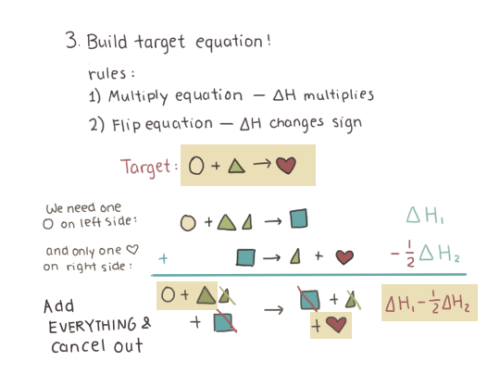

Chapter 5 - Hess’s Law pt.2: Problem solving // Science Scribbles A-Level / IB HL Chemistry collection
(Hess’s Law part 1 | other syllabus topics)
And here is part 2. Hope I managed to explain it somewhat ^^ The reason I drew all these symbols is to explain the method, but once you get it there is no need to draw them every time!
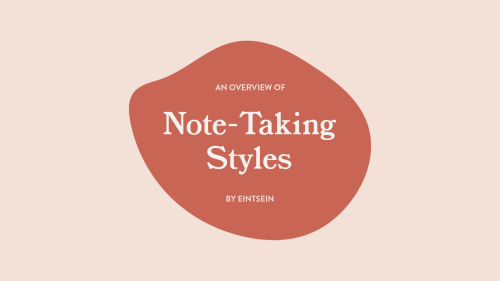

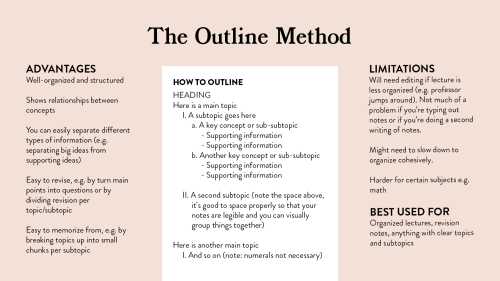
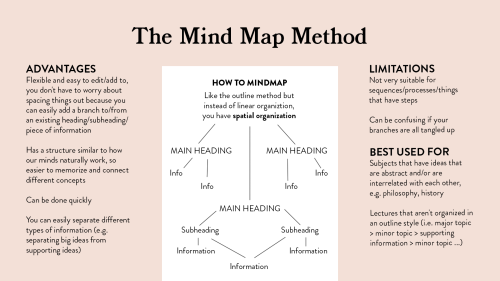

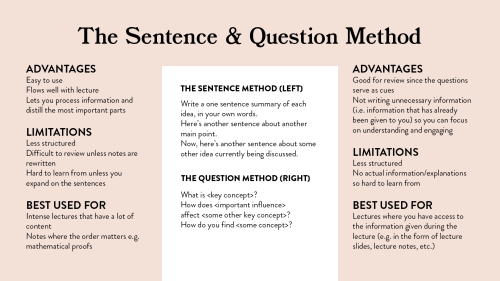


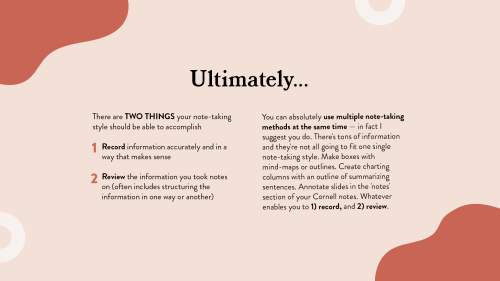
An Overview of Note-Taking Styles
Note-taking is one of the most essential skills a student should master. It allows you to record and review information to be used in the future. But what’s the best way to do so? Here’s an overview of note-taking styles that can help you maximize your learning!

I’m going to uni this autumn, and I feel like most of studyblr’s incoming freshmen are just as clueless as I am. Here’s a bunch of tips from the more experienced among us, and I hope it’s just as useful to you as it is to me!
this took forever to make so i’m really hoping it’s good
Money Matters
Textbooks
Sites where you can get free textbooks by @thearialligraphyproject
Get textbooks online
Tips for textbooks by @theorganizedcoyote
Websites to get cheap textbooks by @theorganisedstudent
Ultimate guide to buying college textbooks
Safe ways to get free textbooks
Saving Money
A girl called jack: eating under the line
Qriket
Scholarship masterpost by @wallcalendar
Save money while shopping online
College scholarships 2016-17 by @wonderstudying
Tips for finding & getting scholarships
How to budget
Where to find student discounts by @collegerefs
Searching for scholarships by @collegesmarts
Creative ways to save money in college
Places that offer discounts with student id
Ways to save/earn money
Paying for college by @collegerefs
Student Life
Dorm & Living
PSA for college freshmen
Dorm tips from @humanitaes
Ultimate school locker (uni bag) kit by @girl-studying
Resolving issues with roommates
Tips for living like an adult
How to eat healthy in dining halls
DIY dorm decor by @notquitenightingale
Everything I actually used in my freshman dorm room
Guide to living alone by @piratestudy
Living with a roommate by @collegerefs
Packing Lists
Thing I forgot to bring to college by @myberkeleyadventure
Sam’s ultimate failproof guide to packing by @staticsandstationery
Ultimate college packing list for freshmen
College packing list by @kimberlystudies
What to bring to college
Checklist for dorms & campus living
Packing up: preparing for college in @theacademiczine
College dorm packing list by @produitivity
Recipes
One-pot chicken fajita pasta
100 dirt cheap recipes for students
57 go-to recipes for college students
Cheap & healthy recipes
Over 400 fast & healthy recipes
Classes
Studying & Taking Notes
Organizing notes with Google Docs by @academla
How to write a lecture summary efficiently by @collegerefs
Symbols & abbreviations for note-taking
How to take lecture notes by @hstrystdyblr
How to take notes in college by @determinationandcaffeine
Getting the most out of lecture by @strive-for-da-best
How to get your best grades in college by @saralearnswell
If you have a bad college professor
Essays
Transition words for essays by @soniastudyblr
How to analyze historical sources by @rewritign
How to write a university level essay by @healthyeyes
Analyzing a written text
Essay writing: university vs. high school
How to write a history paper by @thehistorygrad
How I plan and write literature papers by @notaperfectstudent
Exams
A quick guide to finals by @emmastudies
10 revision tips for final & first year exams
High school exams vs. college exams
Crucial study tips for finals week in college
3 day study plan by @getstudyblr
Low stress college study strategy by @plannerdy
+ More
Masterposts
A college student’s masterpost by @eruditekid
Random college tips by @determinationandcaffeine
College advice by @studenting
Giant college masterpost by @heyiwantyoutostay
Advice
Advice for college by @collegerefs
10 tips for starting uni by @studycubs
Advice from a college senior
Great tips from @fuckstudy
10 more excellent tips
Things nobody tells you about university by @polcry
Miscellaneous
8 things successful students do by @frankfurter-studies
Email tips by @haileymostudies
@collegerefs‘ entire blog– so much good stuff that’s incredibly useful
my grace.uni tag– all the posts I’ve saved for university
Staying in contact with high school friends
How to make friends in college
-
 ucunatwhimlaou liked this · 1 year ago
ucunatwhimlaou liked this · 1 year ago -
 wettmenlivo liked this · 1 year ago
wettmenlivo liked this · 1 year ago -
 panela-na-janela liked this · 2 years ago
panela-na-janela liked this · 2 years ago -
 not-pigicial liked this · 2 years ago
not-pigicial liked this · 2 years ago
a study blog for collected references, advice, and inspiration
267 posts
